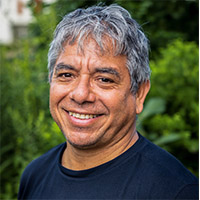Chicken Heaven
 In this episode of Unconfined, Reginaldo Haslett-Marroquin tells us about Tree Range Farms, a poultry ecosystem alternative to the industrial food animal production model that injures workers and degrades the environment. Find out how his farmers create chicken heaven.
In this episode of Unconfined, Reginaldo Haslett-Marroquin tells us about Tree Range Farms, a poultry ecosystem alternative to the industrial food animal production model that injures workers and degrades the environment. Find out how his farmers create chicken heaven.

We’re Not Working with Nature, We Are Nature
By Christine Grillo Subscribe to Host Notes
Americans can’t seem to get enough chicken. Unfortunately, the industrial food animal production model that keeps up with the demand leaves behind a public health mess—from injured workers to environmental degradation to animal welfare concerns that are difficult to quantify. But Tree Range Farms in Northfield, Minnesota, shows us an alternative to the business-as-usual model, integrating modern innovation with ancestral wisdom. The result is a proof of concept in regenerative agriculture.
Reginaldo Haslett-Marroquin, CEO of the enterprise, refers to Tree Range Farms as part of a business ecosystem. It’s a network that includes more than 40 farms in the region, with a sort of modular approach: each flock, or “unit,” is composed of 1,500 chickens that are raised within parameters that seem to be easy to replicate and scale. The birds are raised outside, eating bugs, plants, and grains, living in the shade of hazelnut trees, and contributing to the regeneration of healthy soil. (Civil Eats’ Twilight Greenaway wrote a great article describing how the ecosystem works.)
Regi refers to these animals as “jungle fowl” and the farms as “chicken heaven.” He can tell you all about how the model works by maximizing the efficiency of beneficial relationships between elderberries and hazelnuts and poultry and manure and so on. But what he really likes to talk about is energy, especially the transformation of energy from non-edible energy to edible energy. He insists that we, the humans, are not producing anything. Rather, we’re helping to steward natural processes that would be carrying on very efficiently without us, and were doing it long before we, the humans, arrived on the scene.
He also insists that we’re not working with nature, because when we think about it that way, we’re putting ourselves, the humans, outside of nature. But we’re not outside of nature; we are nature, just like the chickens, the elderberries, and the manure. We’re not managing nature or allowing nature to do something. We can help, steward, and shepherd along some processes that have been underway for literal eons, but there is a kind of arrogance, or perhaps only ignorance, that goes along with thinking we’re the masters of these creations.
In this episode, I find Regi’s humility to be an amazing salve for the rugburn that comes from living in the modern world. Several times, he refers to the tension between knowledge and indigenous intellect. If I’m understanding him correctly, knowledge is a collection of things that we study and learn—biology, genetic engineering, etc.—whereas indigenous intellect is all of that acquired knowledge plus the animal intelligence we’re born with, the things we co-learn with other entities, which I assume includes people, animals, plants, etc., wisdom that is passed down from older generations, and lessons we learn simply through being alive.
I especially love how he describes humans. “At the end of the day,” he says, “we are simply an expression of the energy of the universe that through the processes of photosynthesis, the process of animal intervention, the biophysics and chemistry of the planet, governed by the laws of thermodynamics, came to be this highly organized form of energy that we call a person, like every other living thing, that’s who we are.”
The best way, he says, to do true regenerative agriculture is to understand that regenerative systems have been around long before us. We did not invent it. We need to re-learn it, and we need to learn from it. It’s an entire way of thinking, a way of living, and it’s much more than the application of three or four principles, such as no-till or no-chemicals. We need to reckon with regeneration at an intellectual level and use ancestral ways of thinking.
He salutes the farmer who starts out by going no-till, but he challenges that farmer to go deeper, to think more deeply about her role. Everyone who’s getting into the regenerative game should question and challenge everything. “Not judge,” he says. “But challenge.”
If you’re interested in learning more about Regi’s formal and informal educations, check out his book, In the Shadow of Green Man. It’s an autobiography about his childhood in Guatemala during the 30-year-long civil war, and it chronicles his journey from poverty and hunger to food security and hope.
Are you interested in learning more about how the industrial poultry production model harms workers, and how they’re fighting back? Check out Unconfined’s Episode 4 with Magaly Licolli and Episode 6 with Debbie Berkowitz, both hosted by Tom Philpott.
In Host Notes, the voices behind Unconfined podcast deliver additional context to supplement our interviews. Their views do not necessarily reflect those of the Johns Hopkins Center for a Livable Future or the Johns Hopkins University.